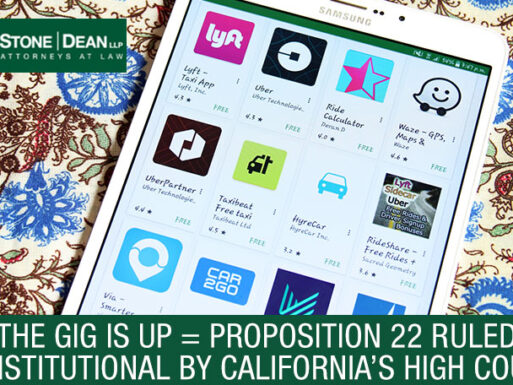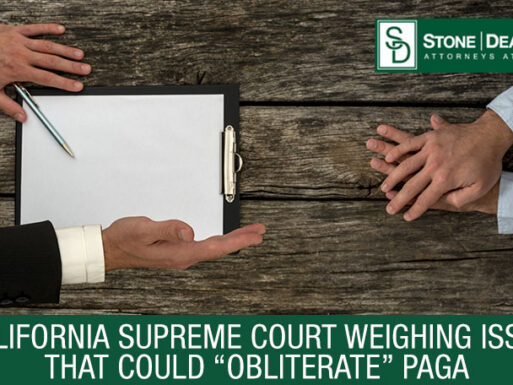March Legal Roundup
By Matthew Harvey & Marleigh Green
Only the best news in Business, Employment, Insurance, and Law from California and around the globe.
Business
- Modern Appealing Clothing, a fashion boutique based in San Francisco, California, has filed a lawsuit against first daughter Ivanka Trump’s brand for unfair competition.
“Citing California law, the suit alleges unfair competition wrought by Ivanka Trump’s advantages as the daughter of the president, citing President Donald Trump’s tweets and the positions and actions of his advisors, including Ivanka’s husband Jared Kushner, according to a court filing published by SF Gate online.”
- A California artist has sued the joint ventures that enlisted his services for copyright infringement. The plaintiff claims that he was not compensated by the company even though they used his designs.
“According to the complaint, in 2014, Johnson was commissioned to create several two-dimensional and three-dimensional metal art work based on Retna’s original works, but he was not paid for his time or labor in creating the artworks.”
Employment
- California restaurant Saint Marc has fired a waiter for questioning patrons about their immigration status before serving them.
“In no way are the actions of this former employee representative of the Saint Marc brand nor are they reflective of the opinions of anyone else on our team, including executive management. We have always celebrated being part of the diverse Huntington Beach community, which means valuing all guests and treating every individual with respect.”
- A California federal judge has declared that McDonald’s is not liable for state labor law violations, ending a suit brought against a McDonald’s franchisee and McDonald’s Corporation by more than 1,200 plaintiffs.
“The judge in the case, Richard Seeborg, granted the company’s petition for summary judgment finding that the workers did not support their argument that the labor code’s definition of an employer extends to companies that “ostensibly” control wages through an agent.”
- The California senate has proposed Senate Bill 807, which offers significant tax breaks for teachers, allowing them to opt out of paying income taxes after five years of teaching, and providing a tax deduction for obtaining their teaching credential.
“In an effort to attract more people to teaching and keep educators in the profession, a California State Senate proposal would make teachers exempt from the state income tax.”
- The California Appeals Court has decided that employees paid on commission are still entitled to paid rest periods even if they don’t have a base salary.
“In rendering its verdict, the court said that the Department of Labor Standards Enforcement doesn’t see any reason why commissioned and piece-rate workers should be treated any differently and as such should be entitled to the same paid 10-minute rest periods.”
Insurance
- The House repeals McCarren-Ferguson Antitrust Exemption for Insurance Companies.
“Insurers are among a handful of industries, including Major League Baseball, that have a special exemption from the federal antitrust laws, the so-called ‘McCarran-Ferguson’ antitrust exemption.”
Los Angeles & California
- The California bullet train may have lost its main source of funding, halting the project indefinitely. California Republicans requested that President Trump cut off the grant money that would have been directed to the bullet train project so that it can be used for other state projects.
“Just hours before the report was issued, results of the state’s latest cap-and-trade auction of greenhouse gas emission allowances – the only source of ongoing bullet train funds – were released and once again it produced almost no money.”
- Two California state senators have come out with a series of bills aimed at the criminal justice system, which they say will address “inequity” when it comes to both adults and juvenile offenders.
“Sen. Ricardo Lara, D-Bell Gardens, and Sen. Holly Mitchell, D-Los Angeles, are expected to announce legislation – eight bills in total – that seek to keep kids out of the juvenile justice system and address what the lawmakers characterized as ‘inequity’ for juveniles and adults.”
- President Trump and California lawmakers may be at odds on the issue of sanctuary policies, something that the president addressed in his January 25 Executive Order. The disagreement could lead to the president withholding federal funding from the state if California does not comply.
“Trump’s Jan. 25 executive order, ‘Enhancing Public Safety in the Interior of the United States,’ defines sanctuary jurisdictions as those that ‘willfully refuse to comply with 8 U.S.C. 1373’ and makes them ‘not eligible to receive federal grants, except as deemed necessary for law enforcement purposes.’”
- California lawmakers are attempting to change a “jailhouse snitch” compensation rule that allows for imprisoned informants to be given unlimited money and perks in exchange for information about fellow inmates.
“Under the bill, snitches like Mexican Mafia members Raymond ‘Puppet’ Cuevas and Jose ‘Bouncer’ Paredes would no longer be able to live like kings behind bars, raking in as much as $3,000 a case as well as cartons of Marlboro cigarettes, fast food, Xbox machines and other perks.”
Legal Updates
- The Ninth Circuit Court has confirmed that California Private Attorney General Act (PAGA) claims can be required by law to go to arbitration if there is an arbitration clause in the suing employee’s contract.
“In two unpublished decisions this month, the Ninth Circuit ruled in Wulfe v. Valero Refining Co. California and Valdez v. Terminix International Company, et al. that California Private Attorney General Act (PAGA) claims can be forced into arbitration based on arbitration clauses in employees’ contracts to which the State of California is not a party.”
- The California Supreme Court has found that government communications that are transmitted via private accounts are still considered public record.
“California Supreme Court rules that emails and text messages sent or received on public officials’ private devices are subject to disclosure under the California Public Records Act, which had originally been designed to cover paper documents.”




